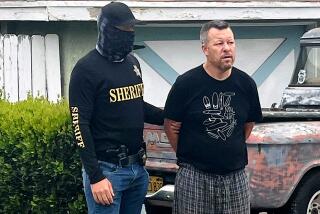Judge Rules Against Change of Venue in Famalaro Murder Trial
- Share via
SANTA ANA — Despite a forceful effort waged by defense attorneys to have the trial moved elsewhere in the state, a Superior Court judge ruled Friday that John J. Famalaro will be tried in Orange County for the murder of Denise Huber.
Famalaro’s attorneys had argued for a change of venue, saying that extensive pretrial publicity had undermined their client’s ability to receive a fair trial--an argument they buttressed with a public opinion poll indicating overwhelming awareness of the case and a strong belief by many that Famalaro is guilty and should be put to death.
But Superior Court Judge John J. Ryan, citing the size of the potential jury pool in the county and the time that has elapsed since Huber’s 1991 disappearance and Famalaro’s 1994 arrest, said enough impartial jurors could be found.
Ryan also said publicity in the case has been “relatively unspectacular” when compared with other high profile murder cases.
“We don’t have any confessions in this case, no admissions, and for a long time we didn’t have a suspect,” he said.
Ryan has ordered more than 1,000 potential jurors in the case. He said that if there are problems finding enough impartial jurors during jury selection, the venue issue will be revisited then.
“I am not convinced that Mr. Famalaro cannot get a fair trial in Orange County,” the judge said. “I think the evidence does show that he can get a fair trial.”
Famalaro, 39, is accused of kidnapping, sexually assaulting and bludgeoning to death the 23-year-old Huber, a resident of Newport Beach, after her car broke down on the Corona del Mar Freeway in June 1991.
Despite a massive publicity campaign launched by Huber’s family and a large-scale police investigation, her disappearance remained a mystery for three years.
In July 1994, Famalaro was arrested after authorities discovered Huber’s body in a freezer in a stolen rental truck parked in the driveway of Famalaro’s home in Dewey, Ariz. He could face the death penalty if convicted.
Deputy Public Defender Leonard Gumlia, one of two attorneys representing Famalaro, cited poll results indicating that 80% of county residents are familiar with the case.
“This has not left people’s minds,” he said. “It is still there.”
Gumlia also called attention to the unique circumstances of the case, the “posthumous” celebrity achieved by Huber after her disappearance, and the nature of the publicity that followed, which he said was sympathetic to Huber and her family and highly negative toward his client.
“Logically, if a victim can gain posthumous celebrity, how can it not be possible for a defendant to gain ‘post-arrest infamy’?” Gumlia asked.
Deputy Dist. Atty. James Mulgrew argued that the opinion survey ordered by the defense was seriously flawed and “close to meaningless.” Both sides called in expert witnesses to support or dispute the survey findings.
Mulgrew said Famalaro’s attorneys had failed to prove that there is a “reasonable likelihood” that a change of venue is warranted.
“I don’t think the publicity here, in a county this size, prevents the court from finding an adequate number of jurors who can serve on this case,” Mulgrew said. “We’re talking about literally millions of people that are prospective jurors.”
Gumlia declined to comment on the judge’s decision after Friday’s hearing, but issued the following written statement: “To put this venue ruling in perspective, imagine 17,174 fans cheering a goal by the Mighty Ducks at the Pond. When that goal is then disputed by the opposition, a jury of 12 is formed to judge whether it should count--a jury chosen from the crowd itself.”
Prosecutors declined to comment after the ruling.
More to Read
Sign up for Essential California
The most important California stories and recommendations in your inbox every morning.
You may occasionally receive promotional content from the Los Angeles Times.










